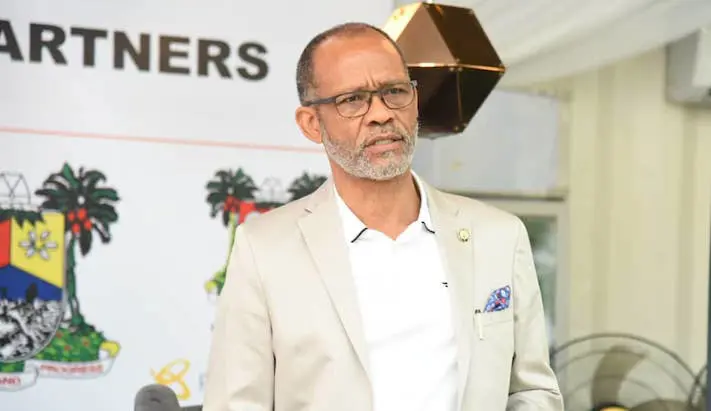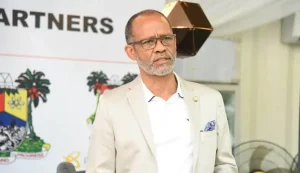
LAGOS, NEMSAS REKINDLE EFFORTS TO TACKLE MATERNAL MORTALITY THROUGH REMSAT PROGRAMME

- Partnership to Improve Emergency Care, Strengthen Healthcare Access
-
Spotlights Urgent Need for Rural Emergency Services in Lagos
In an effort to combat maternal mortality and improve access to emergency healthcare services in hard-to-reach and underserved areas in Lagos, the Ministry of Health and the National Emergency Medical Service and Ambulance System (NEMSAS) have joined forces under the Rural Emergency Services and Maternal Transportation (RESMAT) programme. This World Bank-funded initiative aims to deliver critical emergency medical services to rural communities, bridging healthcare gaps that often put maternal and infant lives at risk.
Speaking at a high-profile advocacy and stakeholders’ engagement meeting, the NEMSAS team lead and Resource Person, Dr. Prosper Ahworegba, noted that the REMSAT programme is dedicated to advancing emergency healthcare and maternal transportation in Lagos State. Accompanying him were the NEMSAS Claim Officer, Mrs. Joke Dada, and External Consultant, Mr. Williams Gerlong, who explained that the visit was aimed at providing insights into RESMAT’s objectives and fostering collaborative efforts to enhance rural emergency medical services.
Dr. Ahworegba presented a detailed briefing on RESMAT, emphasizing the need to address disparities in maternal and child health to reduce high mortality rates, particularly in rural settings. He added that RESMAT is structured to establish a sustainable emergency medical transport framework for pregnant women and vulnerable groups in underserved communities.
He explained that the advocacy visit underscored the urgent need for rural emergency medical services (EMS) as part of Nigeria’s efforts to achieve Sustainable Development Goal 3 on good health and well-being. Dr. Ahworegba highlighted that the lack of EMS infrastructure and transportation options exacerbates maternal mortality and health risks, making the RESMAT initiative, backed by President Bola Ahmed Tinubu’s administration, pivotal for achieving universal health coverage.
He outlined RESMAT’s six-pillar model, focusing on governance, advocacy, quality monitoring, dispatch systems, skills improvement, and financing. “This approach aims to develop a robust EMS system for rural populations, with Lagos among the 15 states selected for World Bank support. The programme anticipates benefiting 1.7 million pregnant women in Lagos by December 2025,” he said.
Dr. Ahworegba also described RESMAT’s three-stage operations model that employs community resources like tricycles and boat ambulances to address maternity emergencies promptly. He stressed that this community-based transport model empowers local populations to access life-saving services during critical moments.
NEMSAS plans a four-step approach to advocacy and behavioral change, engaging community leaders to foster acceptance of emergency services. Training frontline health workers and community first responders will be central, with programs such as Basic Emergency Care (BEC) and Community First Aid Response (CFAR) equipping workers with life-saving skills.
Responding, the Special Adviser to the Lagos State Governor on Health, Dr. (Mrs.) Kemi Ogunyemi, commended NEMSAS for the initiative, highlighting its alignment with Lagos State’s efforts to reduce maternal and infant mortality rates. She pointed to the challenges posed by rapid population growth, healthcare demand, and transportation barriers in riverine and rural areas.
Dr. Ogunyemi expressed optimism that the partnership with NEMSAS would help Lagos meet its ambitious healthcare goals, citing Governor Babajide Sanwo-Olu’s strong commitment to healthcare innovation. She affirmed that expanding healthcare access remains a priority, supported by increased primary healthcare facilities and free antenatal and delivery services.
She disclosed that Lagos State prioritizes safer access routes for emergency services, recently bolstered by five new ambulances donated by the Global Fund to expand LASAMBUS, the state ambulance service.
The Special Adviser opined that collaboration with the private sector, which serves about 60% of Lagos residents, is essential for effective EMS coverage. She expressed gratitude for the Bill & Melinda Gates Foundation’s support for critical healthcare services and infrastructure improvements.
In his remarks, the Commissioner for Health, Prof. Akin Abayomi, highlighted the importance of resilient infrastructure, noting that several LASAMBUS stations were upgraded to permanent structures. He emphasized that durable facilities are critical to maintaining uninterrupted emergency services.
Prof. Abayomi also discussed enhancing communication in emergency responses, underscoring the need for accurate ambulance dispatch. He announced the upcoming launch of the Lagos State Smart Health Information Platform, which aims to integrate public health facilities and improve emergency coordination across Lagos, including remote areas.
One core area of focus in Prof. Abayomi’s remarks was the improvement of communication systems in emergency responses. He noted that speed and accuracy in dispatching ambulances are essential to prevent situations where untrained Good Samaritans attempt interventions that may inadvertently cause harm. “To address these challenges, Lagos State is investing in a sophisticated emergency response call system, integrating ambulances, police, and fire services for a unified approach,” he said.
The Commissioner also shed light on the expansion of emergency services into riverine communities, an often-overlooked demographic in emergency planning. “Collaborating with the Lagos State Waterways Authority (LASWA), the state launched water ambulances to provide critical support to areas only accessible by water,” he noted.
On the decentralization of primary healthcare, Prof. Abayomi mentioned that experienced administrators have been appointed to oversee health districts across Lagos, reflecting the government’s commitment to enhancing access to health services. This restructuring aims to efficiently cater to rural populations, particularly in maternal and child healthcare delivery.
In closing, the Commissioner acknowledged the need for a robust governance and advocacy framework to bridge traditional and orthodox healthcare practices. He highlighted the complex task of convincing rural mothers to access health services far from their homes, which can be daunting for families relying on close community networks.
The Permanent Secretary, Lagos State Ministry of Health, Dr. Olusegun Ogboye, echoed Prof. Abayomi and Dr. Ogunyemi’s sentiments, stressing that partnerships like RESMAT are crucial for sustainable healthcare access. He emphasized the Ministry’s collaboration with local governments to cluster primary healthcare centers around secondary facilities, ensuring strategic resource distribution to enhance emergency response efficiency.
Dr. Ogboye also voiced concerns about the complexity of emergency response, noting that addressing one aspect of delay in emergency services, such as transport, is insufficient if delays continue within hospitals. He suggested a holistic approach to tackle the three main delays: decision-making, transportation, and hospital readiness.
In his remarks, Dr. Ogboye proposed integrating the NEMSAS RESMAT dispatch system with existing emergency frameworks. He recommended that dispatch centers include representatives for specific health emergencies, such as maternal cases, to ensure prompt and accurate response coordination.
Dr. Ogboye further underscored the potential benefits of aligning emergency services with community health initiatives, particularly the Community Health Influencers, Promoters, and Services (CHIPS) program. He suggested that training provided under the emergency system could be extended to CHIPS personnel, enabling them to offer basic emergency response in remote areas.
The Permanent Secretary raised the topic of health insurance as a funding mechanism for emergency services. He emphasized that emergency services, especially those involving critical care, should explore opportunities for coverage under health insurance to ensure long-term sustainability.
Adding to the dialogue, Claims Officer for NEMSAS, Mrs. Joke Dada, shared insights on adapting emergency services to Lagos’s unique urban and rural landscapes. She emphasized the need for comprehensive needs assessments and funding support tailored to Lagos’s specific requirements.
Director of LASAMBUS, Mrs. Wuraola Makinde, gave a comprehensive overview of LASAMBUS progress and operational challenges. Her presentation detailed the upgrades in ambulance design and the addition of trained personnel, funded by state and donor support, which have improved the quality and reliability of LASAMBUS services.
The meeting concluded with a renewed commitment from all stakeholders to drive the RESMAT programme’s objectives, with assurances that Lagos is fully committed to supporting 1.7 million pregnant women by 2025. This milestone reflects the state’s dedication to ensuring that all Lagos residents, regardless of location, have access to critical healthcare services.
